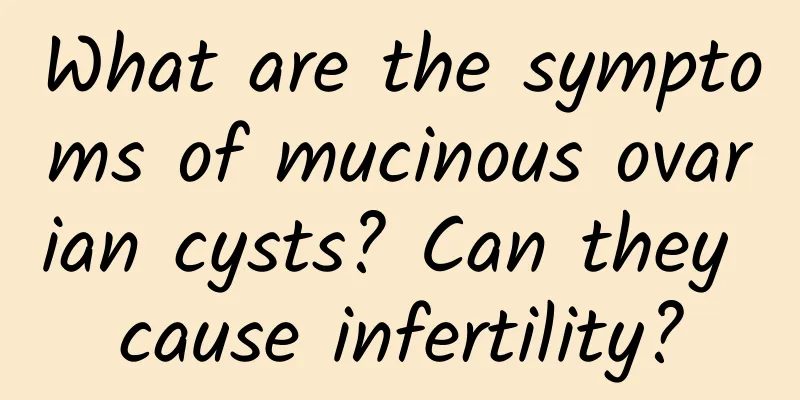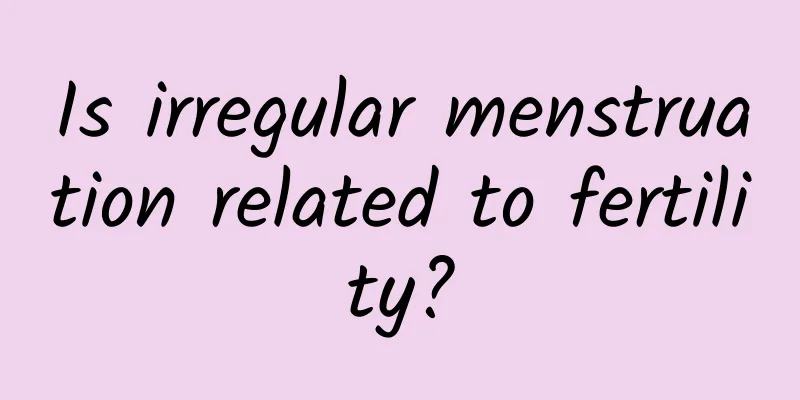What are the symptoms of mucinous ovarian cysts? Can they cause infertility?

|
Can symptoms of mucinous ovarian cysts cause infertility? Ovarian mucous cysts can be physiological and disappear naturally with the changes in the menstrual cycle. The most common pathological ovarian cysts are serous cystadenoma and mucinous cystadenoma. Symptoms of mucinous ovarian cysts include: 1. Benign mucinous cystadenoma is rare on both sides. Generally speaking, compression syndrome is easy to occur. 2. Pelvic masses and ascites are common in borderline mucinous cystadenomas, and abdominal pain or distension may also occur. 3. The symptoms of mucinous cystadenoma are similar to those of serous carcinoma, but unilateral cystadenoma is more common than serous carcinoma. It is generally manifested by abdominal swelling, abdominal distension, abdominal pain or compression symptoms. Cachexia and weight loss may occur in the late stage, and a small number of patients may also have menstrual changes. Complications: Occasionally combined with appendiceal mucinous cystadenoma and peritoneal pseudomyxoma. Benign mucinous cystadenoma should be noted for the combination of borderline or malignant mucinous carcinoma. The chance of pregnancy is 3 to 4 times higher than that of serous cystadenoma. The ovaries are where the eggs develop, mature and are released, and the follicles at different stages are in the ovarian cortex. If the ovaries are damaged, the development, maturation and release of the eggs are impaired, which can lead to infertility. Ovarian mucocysts are a type of ovarian tumor, and their infertility mechanism is related to interference with ovulation function. Ovarian thyroid tumors, ovarian granulosa and other ovarian cysts with endocrine functions - theca cell tumors, testicular blastoma, etc., due to the different tumor tissue components, will produce some corresponding hormones, which interfere with the normal secretion of ovarian hormones and ovulation, and cause symptoms such as amenorrhea, uterine bleeding, hirsutism, and infertility. |
<<: Symptoms of cervical erosion and bleeding in pregnant women
Recommend
Coconut water is a must! 10 benefits for weight loss are also on the list
Summer is the peak season for coconuts, especiall...
What are the characteristics of multiple uterine fibroids?
Multiple uterine fibroids are the most common mul...
Different areas of the same patient show different early symptoms of vulvar leukoplakia
Vulvar leukoplakia can occur in women of all ages...
The best hospital for the treatment of functional uterine bleeding
Adolescent women do not know enough about their o...
Analyzing the etiology of senile vaginitis from the perspective of traditional Chinese medicine
Chinese medicine has some unique insights into th...
Will Motherwort Granules cause miscarriage? What are the precautions for taking Motherwort Granules?
For women, Motherwort Granules is a very commonly...
What should women eat for cervicitis? 5 dietary treatments suitable for women with cervicitis
Most cases of cervicitis are caused by cervical s...
What are the dangers of drinking during menstruation? Be alert after reading this
Women's bodies are more fragile during menstr...
Understand the symptoms of vaginitis and detect the disease as early as possible
Among gynecological diseases, vaginitis has the h...
Drug treatment of endometrial tuberculosis
Endometrial tuberculosis often follows pulmonary ...
The worst thing about losing weight is being too hungry! These foods can help you curb your uncontrolled appetite
When it comes to losing weight, the first thing t...
Can iodine be used to treat cervicitis? Examination and treatment of female cervicitis is the most important
Many women suffer from cervicitis. If severe cerv...
What are the causes of recurrence of cervical erosion?
What are the causes of recurrence of cervical ero...
What are the nursing precautions for adnexitis?
The precautions for adnexitis are not only for pa...
Does ovarian cyst cause ovulation? What are the symptoms?
Will ovarian cysts cause ovulation? What are the ...









